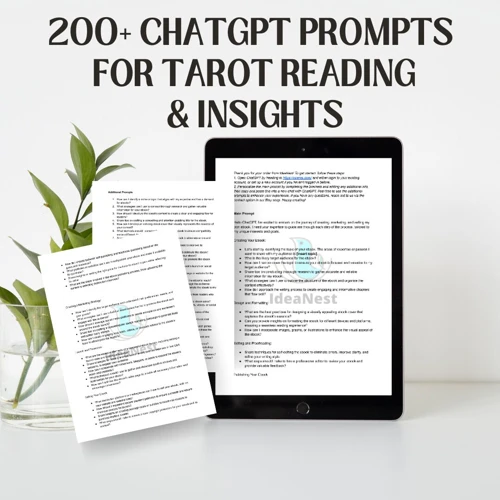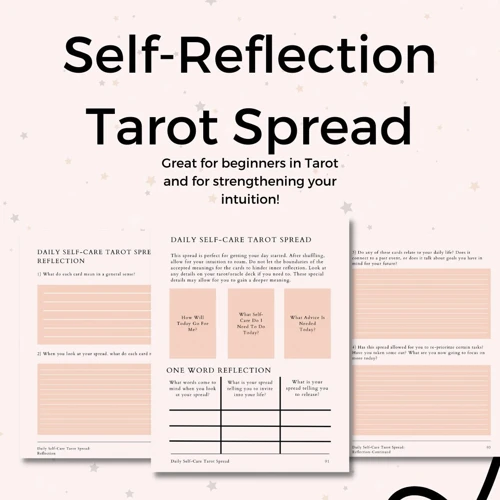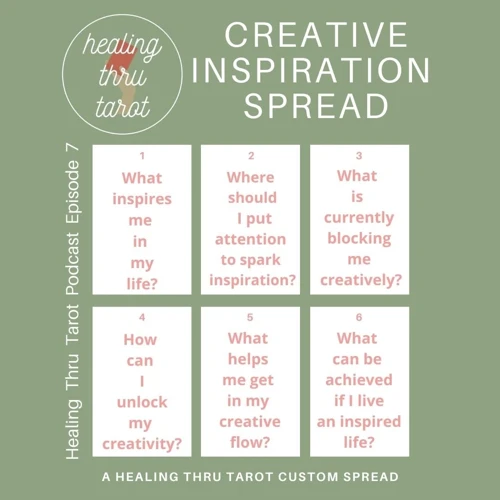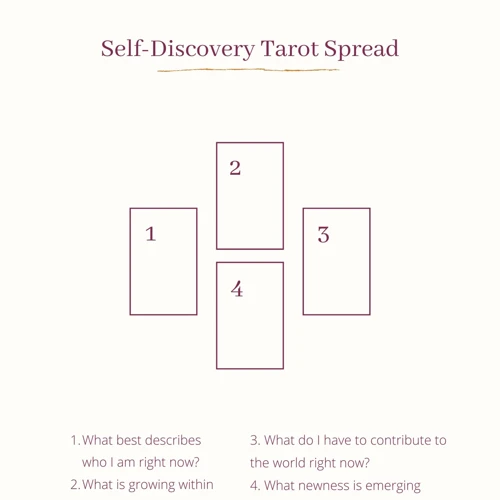Unlocking Personal Growth with Tarot Writing Prompts: A Pathway to Self-Discovery, Healing, and Empowerment
When it comes to personal growth and self-reflection, there are countless methods and techniques available. However, one unique and powerful tool that often goes overlooked is the use of tarot writing prompts. Combining the introspective power of tarot cards with the creative expression of writing, these prompts provide a pathway to unlock personal growth in a profound and transformative way. Whether you’re looking to explore your emotions, set goals, discover hidden aspects of yourself, or release past traumas, tarot writing prompts offer a dynamic and illuminating journey of self-discovery, healing, and empowerment. In this article, we will delve into the world of tarot writing prompts, exploring their benefits and providing a step-by-step guide to incorporating them into your personal growth journey. It’s time to unravel the mysteries of the tarot and unleash your full potential for personal growth and transformation. So grab your tarot deck, a pen, and a journal, and let’s embark on this transformative journey together.
Contents
- Understanding Tarot Writing Prompts
- Getting Started with Tarot Writing Prompts
- Using Tarot Writing Prompts for Personal Reflection
- Using Tarot Writing Prompts for Goal Setting
- Using Tarot Writing Prompts for Self-Discovery
- Using Tarot Writing Prompts for Healing and Release
- Conclusion
-
Frequently Asked Questions
- What is the purpose of tarot writing prompts?
- Do I need to have prior experience with tarot to use tarot writing prompts?
- How do I choose the right tarot deck for tarot writing prompts?
- Can tarot writing prompts be used for goal setting?
- How frequently should I use tarot writing prompts?
- Can tarot writing prompts help with healing and release?
- What if I don’t resonate with the intuitive messages from the tarot cards?
- Can tarot writing prompts help me gain clarity about my emotions?
- Are there specific tarot spreads for journaling?
- Can tarot writing prompts be used for creative writing or storytelling?
- References
Understanding Tarot Writing Prompts

Tarot Writing Prompts are a unique and powerful tool that combines the wisdom and guidance of tarot cards with the creative expression of writing. These prompts can be used to explore various aspects of our lives, emotions, and thoughts, providing valuable insights and self-reflection. There are many ways to incorporate tarot writing prompts into our practice – one approach is to choose a specific tarot card and use it as a prompt for journaling. We can analyze the imagery, symbolism, and messages of the card, and then reflect on how it relates to our current situation or emotions. Another method is to use tarot spreads specifically designed for journaling, such as the Celtic Cross or the Three-Card Spread. These spreads are structured to provide a deeper understanding of ourselves, our desires, and the challenges we may be facing. By engaging in tarot writing exercises, we can unlock a deeper connection with ourselves and gain valuable insights that can aid in personal growth and self-discovery. So grab your favorite tarot deck, open your journal, and let the magic of tarot writing prompts guide you on a transformative journey of self-exploration.
What are Tarot Writing Prompts?
Tarot writing prompts are structured questions or statements that serve as catalysts for deep reflection and self-expression using tarot cards. These prompts guide individuals to explore specific aspects of their lives, emotions, and thoughts by connecting with the imagery and symbolism of the tarot. They are designed to stimulate introspection and encourage personal growth. Tarot writing prompts can be general or tailored to specific themes, such as relationships, career, or personal development. They are commonly used in tarot journaling as a means of self-discovery and exploration. By engaging with tarot writing prompts, individuals can gain valuable insights into their inner world, uncover hidden aspects of themselves, and develop a deeper understanding of their desires, strengths, and challenges. Tarot writing prompts offer a unique opportunity to tap into the wisdom of the cards while also fostering self-awareness and growth. If you’re new to tarot writing prompts, they can provide a structured framework for your journaling practice, allowing you to delve into the depths of your subconscious and unearth profound insights about yourself and your journey. To learn more about incorporating tarot writing prompts into your practice, you can check out our guide on tarot journaling.
The Benefits of Using Tarot Writing Prompts
The Benefits of Using Tarot Writing Prompts:
– Self-Reflection and Insight: Tarot writing prompts encourage deep self-reflection and introspection. By engaging with the cards and writing about them, we gain valuable insights into our emotions, thoughts, and experiences. It allows us to dive deeper into our subconscious mind, uncovering hidden patterns, beliefs, and desires that may have been elusive to us before. This process fosters self-awareness and helps us gain a better understanding of ourselves and our motivations.
– Clarity and Guidance: Tarot cards have long been used as tools for seeking guidance and clarity. When we use tarot writing prompts, we tap into the wisdom and messages of the cards, providing us with guidance and direction in our lives. By reflecting on the prompts and writing out our thoughts, we can gain clarity on issues or decisions we may be facing. The cards act as a mirror, reflecting back to us what we may already know deep down, but may have been hesitant to acknowledge.
– Emotional Healing and Release: Writing about our emotions can be a cathartic and healing experience. By using tarot writing prompts, we create a safe space to explore and process our emotions. It allows us to acknowledge and honor our feelings, whether they are positive or challenging. This process can lead to emotional healing and release as we give voice to our experiences and find validation in our emotions. Through tarot journaling, we discover authentic ways to cope with difficult emotions and develop a greater sense of emotional well-being.
– Personal Growth and Empowerment: Tarot writing prompts provide a pathway to personal growth and empowerment. By exploring the prompts, we invite growth, change, and transformation into our lives. The act of writing itself empowers us to take ownership of our experiences and narratives. We can identify patterns, limiting beliefs, and areas for improvement, paving the way for personal development. As we delve deeper into our inner selves and uncover our true desires and strengths, we gain the confidence and motivation to pursue our goals and live authentically.
Using tarot writing prompts can be a transformative practice that offers a multitude of benefits. It combines the introspective power of tarot with the expressive nature of writing, creating a powerful tool for self-reflection, guidance, healing, and personal growth. So, whether you’re new to tarot or an experienced practitioner, incorporating tarot writing prompts into your practice can open doors to self-discovery and empowerment. Explore your emotions, gain insights, and nurture your personal growth journey through the use of tarot writing prompts.
Getting Started with Tarot Writing Prompts

To get started with tarot writing prompts, there are a few key steps to consider. First, it’s important to choose the right tarot deck that resonates with you and sparks your creativity. Whether you prefer traditional Rider-Waite imagery or a more modern and artistic deck, find one that speaks to your intuition. Once you have your deck, create a sacred space and set the mood for your tarot writing session. This can involve lighting candles, burning incense, or playing soft, soothing music to enhance your focus and relaxation. Next, decide on the specific tarot writing prompt you want to explore. You can select a single card and delve into its meanings and interpretations, or use a tarot spread like the Celtic Cross to gain deeper insights into a particular situation or question. By following these steps and allowing yourself to fully immerse in the process, tarot writing prompts can ignite your creativity, provide clarity and self-reflection, and pave the way for personal growth and self-discovery. So grab your tarot deck, create a sacred space, and let the journey of tarot writing begin.
Choosing the Right Tarot Deck
When it comes to choosing the right tarot deck for your tarot writing practice, there are several factors to consider. Here are some key points to keep in mind:
1. Intuition: Trust your intuition when selecting a tarot deck. The imagery and symbolism of the cards should resonate with you personally and evoke a sense of connection. This will enhance your ability to interpret the cards and receive meaningful guidance during your writing sessions.
2. Artistic Style: Tarot decks come in a wide variety of artistic styles, ranging from traditional to modern, minimalistic to elaborate. Choose a deck that aligns with your aesthetic preferences and evokes a sense of inspiration. The visual appeal of the cards can enhance your creative process and make your tarot writing practice more enjoyable.
3. Theme or Focus: Some tarot decks are centered around specific themes or focuses, such as astrology, nature, or mythology. Consider if there is a particular theme that resonates with you or aligns with the goals of your tarot writing practice. A themed deck can provide unique insights and add depth to your journaling process.
4. Card Interpretation: Different tarot decks may have variations in card interpretations or symbolism. Take the time to explore the guidebook or resources provided with the deck to ensure that the interpretations align with your understanding and resonate with your personal beliefs. This will make it easier for you to connect with the cards during your writing sessions.
5. Budget and Availability: Consider your budget and the availability of different tarot decks. There are countless options available, ranging from mass-produced decks to limited-edition collector’s items. Determine what you are willing to invest financially and how accessible different decks may be to you.
By taking these factors into account, you can choose a tarot deck that is a perfect fit for your tarot writing practice. Remember, the right tarot deck will inspire and empower you as you delve into the depths of self-reflection and creative expression. So trust your instincts, explore the options, and embrace the journey of tarot writing with a deck that resonates with your soul.
Setting the Mood for Your Tarot Writing Session
Setting the mood for your tarot writing session is essential to create an atmosphere of relaxation, focus, and receptivity. Begin by finding a quiet and comfortable space where you can engage in your tarot practice without distractions. Consider dimming the lights or using candles to create a soothing ambiance. You may also choose to play soft instrumental music or nature sounds in the background to enhance the sensory experience. Take a few deep breaths and center yourself before starting your session. This helps to calm the mind and prepare yourself to receive intuitive insights. Some people find it helpful to incorporate rituals into their tarot writing routine. This could include cleansing the space with incense or smudging to purify the energy, or simply taking a moment to set your intention for the session. You might want to keep a special journal specifically for your tarot writing practice, as it can serve as a sacred container for your thoughts and reflections. Taking the time to create a serene and focused environment can greatly enhance your Tarot Writing session and allow for a deeper connection with the cards and your own intuition. So, take a moment to set the mood, clear your mind, and step into the transformative realm of tarot journaling. For more guidance on incorporating emotions into your tarot journaling practice, check out our Emotions in Tarot Journaling guide.
Using Tarot Writing Prompts for Personal Reflection

Tarot Writing Prompts serve as a powerful tool for personal reflection, allowing us to delve deep into our emotions, thoughts, and experiences. By utilizing these prompts, we can explore the depths of our being and gain a better understanding of ourselves. Whether it’s through exploring our emotions and thoughts, gaining clarity and insight, or simply expressing ourselves through journaling, tarot writing prompts provide a safe and structured way to engage in self-reflection. One effective method is to use different tarot spreads specifically designed for journaling. These spreads offer a framework and guide for exploring specific aspects of our lives, such as relationships, career, or personal growth. By using tarot spreads for journaling, we can ask specific questions, draw cards, and interpret their messages to gain deeper insights and new perspectives. So grab your tarot deck, choose a spread that resonates with you, and allow the power of tarot writing prompts to guide you on a transformative journey of personal reflection.
Exploring Your Emotions and Thoughts
Exploring Your Emotions and Thoughts
– Use tarot writing prompts to dive deep into your emotions and thoughts. Draw a card from your tarot deck and reflect on its imagery, symbolism, and messages. What emotions does it evoke? How does it relate to your current state of mind? Write down your observations and insights in your journal.
– Analyze the colors, figures, and symbols on the card. For example, if you draw the “Ace of Cups,” which represents emotions and new beginnings, think about what emotions are present in your life right now and how they may be influencing your thoughts and actions.
– Consider the elements of the card. If there is water depicted, it may symbolize emotions, while fire could represent passion or creativity. Connect these elements with your own experiences and explore the ways they manifest in your life.
– Reflect on any patterns or recurring themes that you notice in your emotions and thoughts. Are there certain emotions that arise frequently? Are there specific thought patterns that keep showing up? Use the insights gained from the tarot prompts to delve deeper into understanding the root causes and effects of these emotions and thoughts.
– Practice self-compassion and allow yourself to be open and honest with your emotions and thoughts. The tarot cards serve as a mirror to your inner self, providing a safe and supportive space for exploration.
By using tarot writing prompts to explore your emotions and thoughts, you can gain a deeper understanding of yourself and develop insight into patterns and behaviors that may be influencing your life. This process of self-reflection and analysis can lead to personal growth and transformation. If you’re interested in exploring different tarot spreads specifically designed for journaling, check out our article on different tarot spreads for journaling.
Gaining Insight and Clarity
Gaining Insight and Clarity
Using tarot writing prompts can be a profound tool for gaining insight and clarity in our lives. It allows us to dive deep into our thoughts, emotions, and experiences, and bring forth a greater understanding of ourselves and the situations we find ourselves in. When we engage in tarot writing prompts, we are prompted to reflect on specific questions or themes that the tarot cards bring to the surface. This process encourages us to explore our thoughts and feelings in a focused and intentional manner.
The symbolism and imagery of the tarot cards serve as catalysts for self-reflection, triggering our intuition and guiding us towards hidden insights and revelations. Through writing, we are able to articulate and process these insights, bringing them to the forefront of our consciousness. This clarity helps us gain a deeper understanding of ourselves, our desires, and the choices we need to make.
Tarot writing prompts also allow us to explore different perspectives and consider alternative solutions or possibilities. By engaging with the cards and translating their messages into words, we create space for new ideas and perspectives to emerge. This expanded viewpoint can lead to breakthroughs and a fresh outlook on challenging situations or personal dilemmas.
The act of writing itself is cathartic and liberating. It helps us untangle our thoughts and emotions, bringing order to the chaos within. Through journaling with tarot writing prompts, we are able to release any mental clutter or confusion and gain a sense of mental and emotional clarity. This clarity empowers us to make informed decisions and take action in alignment with our true selves.
Engaging in tarot writing prompts opens the door to gaining insight and clarity in our lives. Through focused reflection, exploration of symbolism, and the act of writing, we unlock hidden truths, consider new perspectives, and find mental and emotional clarity. This process empowers us to navigate through life’s challenges with a greater understanding of ourselves and the world around us. So grab your tarot deck, find a quiet space, and let the power of tarot writing prompts guide you on a journey of self-discovery and enlightenment.
Journaling and Self-Expression
Journaling and self-expression are integral components of using tarot writing prompts for personal growth. Through the act of journaling, we have a safe and private space to explore our thoughts, emotions, and experiences in a free-flowing and uncensored manner. This process allows us to tap into the depths of our subconscious and gain a deeper understanding of ourselves. With tarot writing prompts, journaling becomes even more profound as we can use the insights and guidance from the tarot cards as a springboard for self-reflection. The cards help us to delve into the core of our being, unlocking hidden emotions, desires, and patterns that may be influencing our lives. Writing down these discoveries not only helps us to process and make sense of our experiences but also allows us to witness our growth and transformation over time. Journaling serves as a form of self-expression. We can use it as a medium to articulate our innermost thoughts, dreams, and aspirations. It enables us to release any pent-up emotions or tensions and provides a platform for self-empowerment and self-validation. The act of physically writing also engages different parts of our brain, fostering a deeper connection with our own thoughts and enabling us to gain clarity in our journey towards personal growth. So, grab your pen and journal, and let the words flow onto the pages, unlocking the power of journaling and self-expression through tarot writing prompts.
Using Tarot Writing Prompts for Goal Setting

Using tarot writing prompts for goal setting is a powerful and transformative practice that can help us envision and manifest our desires. One way to incorporate tarot writing prompts into our goal-setting process is by first identifying our goals and desires. We can draw a tarot card or use a specific spread tailored to goal setting, and then reflect on the messages and insights the cards provide. This can help us gain clarity about our intentions and the steps we need to take to achieve our goals. Next, we can create action plans based on the guidance we receive from the tarot. We can use the prompts to brainstorm ideas, set deadlines, and break our goals down into achievable steps. Tracking and celebrating our progress is also important, and tarot writing prompts can assist in this aspect as well. We can use prompts to reflect on our achievements, assess any obstacles or setbacks, and adjust our plans accordingly. By incorporating tarot writing prompts into our goal-setting process, we tap into the wisdom of the cards and align our actions with our intentions, leading to a more focused and empowered journey towards our dreams. So grab your tarot deck and journal, and let the magic of tarot guide you towards achieving your goals and desires.
Identifying Your Goals and Desires
Identifying Your Goals and Desires:
– Reflect on your aspirations: Begin by taking a moment to reflect on what you truly desire in life. What are your long-term goals, dreams, and ambitions? Allow yourself to dig deep and explore what truly resonates with your core values and passions.
– Create a vision board: Consider creating a visual representation of your goals and desires. A vision board can be a powerful tool for manifestation. Gather images, words, and symbols that represent what you want to achieve or attract into your life. Arrange them on a board or in a journal, and use it as a visual reminder of your goals.
– Set SMART goals: Once you have a clear vision of what you want to achieve, turn them into SMART goals. SMART stands for Specific, Measurable, Achievable, Relevant, and Time-bound. By setting goals that are specific and measurable, you can track your progress and stay motivated. Ensure that your goals are achievable and relevant to your values and aspirations. Lastly, assign a timeline to each goal to create a sense of urgency and structure.
– Prioritize and break it down: Take a look at your list of goals and desires and prioritize them based on importance and feasibility. Then, break each goal down into smaller, actionable steps. This process helps make your goals more manageable and allows you to stay focused and motivated as you make progress.
– Embrace flexibility and adaptability: Remember that identifying your goals and desires is not set in stone. Life is fluid, and circumstances may change. Be open to adjusting and adapting your goals as needed. Remain flexible and allow yourself the freedom to grow and shift your aspirations as you navigate your personal growth journey. Keep revisiting and reevaluating your goals to ensure they continue to align with your evolving dreams and desires.
By diligently identifying your goals and desires through tarot writing prompts, you gain clarity, focus, and direction in your personal growth journey. Use the tarot as a guiding tool, allowing its insights and symbolism to assist you in aligning your goals with your authentic self.
Creating Action Plans
Creating Action Plans
Once you have identified your goals and desires through tarot writing prompts, the next step is to create action plans. Action plans serve as a roadmap to guide you towards achieving your goals and turning your visions into reality. Start by breaking down your goals into smaller, actionable steps. Each step should be specific, measurable, attainable, relevant, and time-bound (SMART). Write down these steps in your journal, using bold or bullet points to make them stand out. Be sure to include deadlines or timelines for each step to keep yourself accountable and motivated.
As you create your action plans, consider any obstacles or challenges that may arise along the way. Think about potential solutions or strategies to overcome these hurdles and include them in your plan. This will help you stay prepared and confident in the face of adversity.
Additionally, it can be helpful to prioritize your action steps. Determine which steps are the most crucial to take first and focus your energy and resources on those. By breaking your goals into smaller, manageable tasks and prioritizing them, you are setting yourself up for success.
Remember, action plans are not set in stone. They can be revised and adjusted as you progress on your personal growth journey. Regularly review and evaluate your action plans to ensure they are still aligned with your goals and make any necessary changes along the way. Celebrate each milestone you achieve, no matter how small, and use it as fuel to keep moving forward. Creating action plans through tarot writing prompts empowers you to take tangible steps towards your goals and brings you one step closer to manifesting the life you desire.
Tracking and Celebrating Progress
Tracking and Celebrating Progress
Tracking our progress is a crucial aspect of personal growth and goal setting. When using tarot writing prompts, it’s important to keep a record of our insights, reflections, and action plans. This allows us to track our progress over time and see how far we’ve come in our journey. A journal dedicated to our tarot writing practice serves as a visual representation of our growth and development. We can revisit previous entries, reviewing the challenges we’ve overcome, the goals we’ve achieved, and the insights we’ve gained. Tracking our progress also helps us stay accountable. By regularly writing in our tarot journal, we create a habit of self-reflection and self-awareness. We can use different methods of tracking, such as utilizing spreads specifically designed for monitoring progress or creating charts and graphs to visualize our achievements. Celebrating our progress is equally important. Every milestone, no matter how small, deserves recognition and celebration. When we acknowledge our accomplishments, we cultivate a positive mindset and motivation to continue on our personal growth journey. We can celebrate by rewarding ourselves, sharing our achievements with supportive friends or online communities, or simply taking a moment to appreciate how far we’ve come. Tracking and celebrating progress with tarot writing prompts creates a sense of accomplishment, boosts self-confidence, and inspires us to reach for even greater heights. So let’s honor our growth, embrace our achievements, and continue on this transformative path of personal development.
Using Tarot Writing Prompts for Self-Discovery

Tarot writing prompts serve as powerful tools for self-discovery, enabling us to explore our strengths, weaknesses, and hidden aspects of ourselves. Through tarot journaling, we can delve deep into our thoughts, emotions, and desires, gaining a clearer understanding of who we truly are. By using tarot cards as prompts, we can ask ourselves thought-provoking questions and reflect on the messages and symbolism of the cards. This process allows us to uncover insights and perspectives that might have been buried within us. Tarot writing prompts provide a safe and nurturing space for self-expression, allowing us to embrace our authentic selves and cultivate self-acceptance and empowerment. Whether we are exploring our passions, values, or personal beliefs, tarot writing prompts offer a transformative journey of self-discovery and self-expression. So grab your tarot deck, journal, and pen, and embark on a voyage of self-exploration and personal growth with the guidance of tarot writing prompts.
Exploring Your Strengths and Weaknesses
Exploring Your Strengths and Weaknesses
Tarot writing prompts can be a powerful tool for delving into our strengths and weaknesses, allowing us to gain a deeper understanding of ourselves and our personal growth potential. To explore our strengths, we can draw a tarot card and reflect on its qualities and symbolism. For example, the Strength card represents inner courage and resilience, reminding us of our innate strengths and capabilities. We can then write about times when we have displayed these qualities in our lives, showcasing our resilience, determination, and ability to overcome challenges. Similarly, the Queen of Cups may symbolize emotional intelligence and compassion, prompting us to recognize and explore these qualities within ourselves.
On the other hand, tarot writing prompts can also assist us in understanding our weaknesses or areas for improvement. Drawing a card that represents a perceived weakness or challenge can provide valuable insights into areas that may need attention. For instance, the Five of Swords may indicate a tendency towards conflict or self-sabotage, inviting us to explore why we engage in such behaviors and how we can work towards self-growth and harmony instead. By honestly examining our weaknesses through tarot writing prompts, we can identify areas for growth and create actionable steps to overcome obstacles and develop ourselves further.
Through tarot writing prompts, we can gain awareness of both our strengths and weaknesses, honoring and nurturing our strengths while actively working towards improving our weaknesses. The act of journaling allows us to dive deeper into our thoughts and emotions, offering a safe space for self-reflection and personal growth. By acknowledging our strengths and weaknesses, we can harness the power of self-awareness to cultivate personal transformation and empowerment. Tarot writing prompts offer us the opportunity to embrace our whole selves with compassion and curiosity, paving the way for a journey of self-acceptance and growth. So grab your tarot deck, embrace the mysteries within, and let the exploration of your strengths and weaknesses begin.
Uncovering Hidden Aspects of Yourself
– Tarot writing prompts can be a powerful tool for uncovering hidden aspects of yourself that may have been buried or overlooked. The tarot cards have a way of tapping into our subconscious mind and revealing truths that we may not be aware of consciously. Using tarot writing prompts allows us to explore different aspects of our personality, past experiences, and underlying beliefs. By delving into the messages and symbolism of the cards, we can gain insights into parts of ourselves that we may have disregarded or forgotten. The prompts can guide us to reflect on our values, fears, desires, and dreams, helping us to discover new layers of our identity. It’s like peeling back the layers of an onion, revealing hidden depths and complexities of our being that we may not have realized were there. Through this process, we can gain a deeper understanding and acceptance of ourselves, providing an opportunity for personal growth and self-empowerment.
– One way to uncover hidden aspects of yourself is by using open-ended tarot writing prompts. These prompts allow for a free-flowing expression of thoughts and emotions, encouraging us to dig deep and explore uncharted territories within our psyche. For example, a prompt may ask us to reflect on a tarot card that represents a hidden aspect of ourselves and write about how it resonates with us. The act of writing helps us to externalize our thoughts and gain clarity, enabling us to unlock hidden truths and gain new perspectives. Additionally, the act of journaling allows for introspection and self-reflection, providing a safe space to explore our innermost thoughts and feelings. By engaging in this practice regularly, we can gradually uncover and integrate these hidden aspects, leading to a greater sense of wholeness and self-understanding.
– Another technique to uncover hidden aspects of yourself is through the use of shadow work tarot prompts. Shadow work involves delving into the darker and more challenging aspects of ourselves that we may have repressed or denied. These prompts prompt us to acknowledge and explore these shadow aspects in a compassionate and non-judgmental way. Through this process, we can confront our fears, heal old wounds, and integrate these hidden aspects into our conscious awareness. This can be a transformative journey of self-discovery, allowing us to reclaim our power and embrace the totality of who we are. As we shine light on the shadows, we may uncover hidden talents, strengths, and wisdom that have been waiting to be acknowledged. By embracing and integrating these hidden aspects, we can experience greater self-acceptance, inner balance, and personal growth.
– Ultimately, uncovering hidden aspects of yourself through tarot writing prompts is a deeply personal and introspective process. It requires a willingness to explore the unknown, face your fears, and embrace all parts of yourself. As you engage in this practice, trust in the process and allow yourself to be open to what arises. With time and patience, you may uncover hidden treasures within yourself that can lead to profound personal transformation and growth. Remember, the journey of self-discovery is ongoing, and tarot writing prompts provide a valuable tool for navigating this ever-evolving path.
Embracing Self-Acceptance and Empowerment
Embracing self-acceptance and empowerment is a fundamental aspect of personal growth that can be facilitated through tarot writing prompts. The beauty of tarot lies in its ability to tap into our subconscious mind and reveal hidden truths about ourselves. By using tarot writing prompts focused on self-acceptance, we can explore aspects of ourselves that we may have been avoiding or suppressing. The cards act as mirrors, reflecting our strengths, weaknesses, and unique qualities. Through this process, we learn to embrace our true selves, both the light and shadow aspects. Tarot writing prompts can guide us to acknowledge and accept our imperfections, releasing the need for external validation and comparison. Instead, we can shift our focus towards self-empowerment and personal growth. By embracing self-acceptance, we cultivate a strong sense of self-worth and confidence, allowing us to make empowered decisions and take positive action towards our goals. Tarot writing prompts provide a safe space for exploration and reflection, opening the door to a deeper understanding of ourselves and fostering a sense of inner strength. As we embrace self-acceptance and empowerment, we find the courage to show up authentically in all areas of our lives, fostering personal growth, and creating a life that aligns with our true essence. Embracing self-acceptance and empowerment through tarot writing prompts is a transformative journey that can lead to living a more fulfilling and authentic life.
Using Tarot Writing Prompts for Healing and Release
Tarot writing prompts can be a powerful tool for healing and release, allowing us to identify and address blocks, limiting beliefs, and past traumas. By engaging in reflective writing exercises using tarot cards, we can gain insights into our emotional wounds and begin the healing process. One way to use tarot for healing is to draw a card that symbolizes a particular issue or blockage and journal about it. We can explore how this issue has affected us and look for ways to release and heal from it. Another approach is to use tarot spreads specifically designed for healing and forgiveness, such as the Past-Present-Future spread or the Heart-Head-Hand spread. These spreads can guide us in reflecting on our past traumas, forgiveness, and self-compassion. Through the transformative power of tarot writing prompts, we can cultivate self-acceptance, compassion, and healing, allowing us to let go of the past and move forward on our personal growth journey. So grab your tarot deck, find a quiet space, and embark on a path of healing and release with the guidance of tarot writing prompts.
Identifying Blocks and Limiting Beliefs
Identifying blocks and limiting beliefs is a crucial step in our personal growth journey. Tarot writing prompts can be incredibly effective in helping us uncover these hidden obstacles that may be holding us back from reaching our full potential. When using tarot cards to explore this topic, we can start by asking specific questions related to our blocks and limiting beliefs. For example, “What beliefs are preventing me from pursuing my dreams?” or “What past experiences have shaped my current mindset?” We can then draw a card or a series of cards to provide guidance and insight. The imagery and symbolism in the cards can act as a mirror, reflecting back to us our subconscious thoughts and beliefs. By examining the meanings and messages of the cards, we can gain a deeper understanding of our internal barriers and begin to challenge and overcome them. The act of journaling allows us to bring these revelations into conscious awareness, helping us to break free from our limitations and embrace a more empowered mindset. With each writing session, we can continue to explore and confront our blocks and limiting beliefs, creating a pathway for personal growth and transformation. It’s important to remember that identifying these obstacles is just the first step – the true work lies in taking action to dismantle and replace them with empowering beliefs and behaviors.
Releasing Past Traumas and Forgiveness
Releasing past traumas and practicing forgiveness is an essential part of personal growth and healing. Tarot writing prompts can provide a safe and supportive space to explore these deep-seated emotions and experiences. Here are some ways in which tarot writing prompts can aid in releasing past traumas and fostering forgiveness:
- Identifying Triggers and Patterns: Tarot cards can act as mirrors, reflecting back to us certain patterns or triggers that may be connected to past traumas. By using tarot writing prompts, we can delve deep into our past experiences and gain insights into how they continue to impact our present circumstances. This self-awareness allows us to recognize and address these triggers and patterns in a healthy and healing way.
- Unveiling Emotional Blockages: Past traumas can create emotional blockages that hinder our personal growth. Tarot writing prompts can help us tap into these blocked emotions, allowing us to release them through journaling. By expressing our feelings and experiences on paper, we can gain a sense of catharsis and liberation, freeing ourselves from the weight of the past.
- Cultivating Self-Compassion and Understanding: Forgiveness is a crucial aspect of releasing past traumas. Through tarot writing prompts, we can explore the perspectives of others involved in the traumatic experiences and develop a deeper understanding of their motivations or circumstances. This broader perspective allows us to cultivate compassion, not only towards others but also towards ourselves. By understanding the complex dynamics of a situation, we can begin to let go of resentment and anger, opening the door to forgiveness.
- Rituals and Healing Practices: Tarot writing prompts can be integrated into healing rituals and practices to facilitate the process of releasing past traumas and practicing forgiveness. For example, after reflecting on a tarot card related to forgiveness, we can write a forgiveness letter to ourselves or others involved in the traumatic experience. This act of writing and releasing our emotions can provide a powerful sense of closure and liberation.
Incorporating tarot writing prompts into our healing journey allows us to confront, process, and release past traumas and embrace forgiveness as a transformative tool. By granting ourselves permission to heal and let go, we pave the way for personal growth, inner peace, and emotional well-being.
Cultivating Self-Compassion and Healing
Cultivating Self-Compassion and Healing:
1. Practice Self-Compassion: Tarot writing prompts can be a powerful tool in cultivating self-compassion. By exploring our emotions and experiences through tarot, we can gain a deeper understanding of ourselves and our struggles. Use tarot cards as prompts to reflect on moments when you’ve been hard on yourself or experienced self-criticism. Consider what lessons you can learn from these experiences and how you can show yourself compassion and understanding.
2. Seek Guidance for Healing: Tarot cards can provide guidance and insights on the path to healing. Use tarot writing prompts to inquire about areas of your life where you may need healing or support. Draw cards and reflect on their meaning and messages. Ask questions such as, “What steps can I take to heal from past traumas?” or “What actions can I take to nurture my emotional well-being?” Let the wisdom of the tarot guide you toward self-healing.
3. Embrace Forgiveness: Forgiving ourselves and others is an essential part of the healing process. Use tarot writing prompts to explore forgiveness and let go of any resentments or burdens you may be carrying. Draw a card and reflect on the qualities of forgiveness it represents. Allow yourself to release any negative emotions and choose to focus on fostering compassion and understanding towards yourself and others.
4. Engage in Rituals and Self-Care: Incorporate rituals and self-care practices into your tarot writing sessions to cultivate self-compassion and healing. Light candles, burn incense, or create a sacred space that promotes relaxation and introspection. Engage in activities that nurture your well-being, such as taking a bath, practicing meditation, or journaling. These rituals can create a healing atmosphere and enhance your connection with the tarot cards and your inner self.
5. Track Your Progress: Tarot writing prompts can be a long-term practice for self-compassion and healing. Keep a record of your tarot readings and reflections over time. Notice any patterns or shifts in your mindset, emotional well-being, and level of self-compassion. Celebrate your progress and acknowledge the growth you experience on your healing journey. Use your journal as a map of transformation, reminding yourself of the steps you’ve taken toward cultivating self-compassion and achieving healing.
Remember, tarot writing prompts are a supportive tool on your path to self-compassion and healing. Be gentle with yourself, embrace the process, and allow the tarot to guide you toward a place of love, understanding, and wellness.
Conclusion
In conclusion, tarot writing prompts offer a powerful and effective tool for unlocking personal growth and self-discovery. By combining the intuitive guidance of tarot cards with the introspective practice of writing, individuals can gain valuable insights, explore their emotions, set goals, and heal from past traumas. Whether you are a seasoned tarot reader or new to the practice, incorporating tarot writing prompts into your daily routine can lead to profound transformation and empowerment. The benefits of tarot writing prompts are vast – they allow for deep reflection, provide clarity and insight, and foster a sense of self-acceptance and self-empowerment. Through journaling and self-expression, individuals can explore their strengths, uncover hidden aspects of themselves, and cultivate self-compassion. Additionally, tarot writing prompts can help identify and release blocks and limiting beliefs, paving the way for healing and forgiveness. By tracking and celebrating progress, individuals can stay motivated and engaged in their personal growth journey. Remember, each tarot writing session is a sacred space for personal exploration, allowing you to dive deeper into your psyche and tap into your inner wisdom. So, embrace the magic of tarot writing prompts and embark on a transformative journey of self-discovery, healing, and empowerment.
Frequently Asked Questions
What is the purpose of tarot writing prompts?
The purpose of tarot writing prompts is to facilitate personal growth, self-reflection, and self-discovery. These prompts use the imagery and symbolism of tarot cards to inspire deep introspection and provide insights into various aspects of our lives.
Do I need to have prior experience with tarot to use tarot writing prompts?
No, prior experience with tarot is not necessary to use tarot writing prompts. The prompts are designed to be accessible to beginners and can be a great way to start exploring the world of tarot cards and their potential for personal growth.
How do I choose the right tarot deck for tarot writing prompts?
Choosing the right tarot deck for tarot writing prompts is a personal decision. It’s important to select a deck that resonates with you and that you feel a connection with. You can explore different decks, look at the artwork and imagery, and choose the one that speaks to you the most.
Can tarot writing prompts be used for goal setting?
Absolutely! Tarot writing prompts can be a powerful tool for goal setting. By using the tarot cards as inspiration, you can gain clarity on your goals, identify action steps, and track your progress. Tarot writing prompts can help you set meaningful and aligned goals for personal growth.
How frequently should I use tarot writing prompts?
There is no fixed frequency for using tarot writing prompts. You can use them as often as you like – it could be daily, weekly, or whenever you feel the need for self-reflection and exploration. Listen to your intuition and create a writing practice that feels right for you.
Can tarot writing prompts help with healing and release?
Yes, tarot writing prompts can be an effective tool for healing and release. They can help you identify emotional blocks, limiting beliefs, and past traumas that may be holding you back. Through journaling and self-expression, you can cultivate self-compassion and embark on a journey of healing and self-empowerment.
What if I don’t resonate with the intuitive messages from the tarot cards?
Not resonating with the intuitive messages from the tarot cards is completely normal. Tarot is a personal and subjective experience, and sometimes certain cards may not resonate with your current situation or emotions. If this happens, trust your inner wisdom and don’t force the interpretation. Explore different prompts or give it some time before returning to the cards.
Can tarot writing prompts help me gain clarity about my emotions?
Yes, tarot writing prompts can be a wonderful aid in gaining clarity about your emotions. By using tarot cards as a reflective tool, you can delve into various emotions and explore their root causes, triggers, and patterns. This process can provide valuable insights and lead to a deeper understanding of your emotional landscape.
Are there specific tarot spreads for journaling?
Yes, there are specific tarot spreads that are ideal for journaling purposes. These spreads are designed to provide a structure for your tarot writing prompts and guide your exploration. Some widely used spreads include the Celtic Cross, the Three-Card Spread, and the Past-Present-Future Spread. Explore different spreads and choose the one that resonates with your journaling practice.
Can tarot writing prompts be used for creative writing or storytelling?
Absolutely! Tarot writing prompts can be a fantastic tool for creative writing and storytelling. By using the imagery and symbolism of the tarot cards, you can tap into your imagination and let the cards inspire unique characters, plotlines, and themes. Tarot writing prompts can be a gateway to unlock your creativity and take your writing to new heights.






